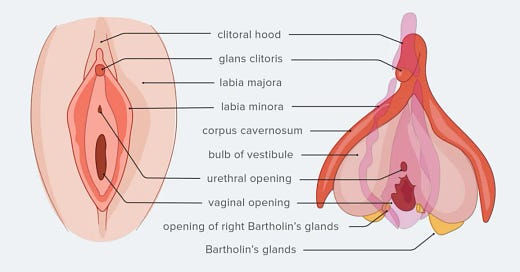The ideal way to engage with this newsletter is through the audio version but if you don’t have time, read ahead.
This podcast (newsletter) is made for anyone out there who doesn’t feel that they deserve pleasure and doesn’t even know how to get the pleasure that they deserve.
I’m here to celebrate women’s pleasure and women’s bodies and discontinue the cycle of shame and harm.
Going forward- we hold these truths to be self evident:
Sex should not hurt.
Bad sex is a health crisis.
You don’t just deserve to not be in pain, you deserve pleasure!
From The Female Price of Male Pleasure:
“Research shows that 30 percent of women report pain during vaginal sex, 72 percent report pain during anal sex, and "large proportions" don't tell their partners when sex hurts.
Debby Herbenick, a professor at the Indiana University School of Public Health, and one of the forces behind the National Survey of Sexual Health and Behavior, confirmed this. "When it comes to 'good sex,'" she told me, "women often mean without pain, men often mean they had orgasms."
As for bad sex, University of Michigan Professor Sara McClelland… discovered in the course of her research on how young men and women rate sexual satisfaction that "men and women imagined a very different low end of the sexual satisfaction scale."
While women imagined the low end to include the potential for extremely negative feelings and the potential for pain, men imagined the low end to represent the potential for less satisfying sexual outcomes, but they never imagined harmful or damaging outcomes for themselves. ["Intimate Justice: Sexual satisfaction in young adults"]”
*Note: Most of what’s ahead is directly quoted from other sources. It is not my intellectual property! I heavily reference a book called, Come as You Are, by Emily Nagoski. Please buy her book and support her amazing work.
Step one: please yourself first, please yourself always!
But when we begin to live from within outward, in touch with the power of the erotic within ourselves, and allowing that power to inform and illuminate our actions upon the world around us, then we begin to be responsible to ourselves in the deepest sense. For as we begin to recognize our deepest feelings, we begin to give up, of necessity, being satisfied with suffering and self-negation, and with the numbness which so often seems like their only alternative in our society. Our acts against oppression become integral with self, motivated and empowered from within.
But, like, how? First, let’s meet the clitoris:
(I stole this from Alyse Knorr and her Cliteracy Presentation)
Australian doctor Helen O’Connell discovered the internal anatomy of the clitoris (the “complete clitoris”) using an MRI in 1998.
The clitoris is the only body part that exists for pleasure alone: it contains 8,000 nerves in the glans alone (double that of the penis)
The clitoris is the only body part that never ages. 1.5x larger at puberty and can grow another 2.5x larger after menopause. It still works as well at 80 as it did at 20.
The clitoris can swell by 50-300 percent.
The history of female anatomy:
(Also stolen from Alyse)
The clitoris has been discovered and re-discovered from ancient times on.
Consistent view historically of female bodies as “flawed” male bodies.
1800s: hysterical women were either masturbated or given clitoridectomies
1920s and 30s: belief that vaginas are filled with bacteria and need to be douched
1981: the Federation of Feminist Women’s Health Clinics published the first anatomically correct images of the clitoris
2009: first 3D sonography of the clitoris completed by French researchers
tl;dr
Everyone’s genitals are made of the same parts, organized in different ways. No two alike.
Are you experiencing pain? If so, talk to a medical provider. If not, then your genitals are normal and healthy and beautiful and perfect just as they are.
The genitals you see in soft-core porn images may have been digitally altered to appear more “tucked in”; don’t let that fool you into believing that all vulvas look that way.
Find a mirror (or use the self-portrait camera on your phone) and actually look at your clitoris. Knowing where the clitoris is is important, but knowing where your clitoris is is power.
Excerpt From, Come As You Are: Revised and Updated, Emily Nagoski
Also read:
The Clitoris Doesn’t Get the Attention it Deserves
Trauma and sex and attachment
tl;dr
Stress reduces sexual interest in 80–90 percent of people and reduces sexual pleasure in everyone—even the 10–20 percent of people for whom it increases interest. The way to deal with stress is to allow your body to complete the stress response cycle.
Trauma survivors’ brains sometimes learn to treat “sex-related” stimuli as threats, so that whenever the accelerator is activated, the brakes are hit, too. Practicing mindfulness is an evidence-based strategy for decoupling the brakes and accelerator.
In the right context, sex can attach us emotionally to new partners or reinforce emotional bonds in unstable relationships. In other words, sex and love are closely linked in our brains—but only in the right context.
Sex that brings you closer to your partner “advances the plot,” as opposed to gratuitous sex, for no reason other than that you can. To have more and better sex, give yourself a compelling reason to have sex, something important to move toward.
Excerpt From, Come As You Are: Revised and Updated, Emily Nagoski
Desire: spontaneous vs. responsive
tl;dr
Your brain has a sexual “accelerator” that responds to “sex-related” stimulation—anything you see, hear, smell, touch, taste, or imagine that your brain has learned to associate with sexual arousal.
Your brain also has sexual “brakes” that respond to “potential threats”—anything you see, hear, smell, touch, taste, or imagine that your brain interprets as a good reason not to be turned on right now. These can be anything from STIs and unwanted pregnancy to relationship issues or social reputation.
There’s virtually no “innate” sex-related stimulus or threat; our accelerators and brakes learn when to respond through experience.
People vary in how sensitive their brakes and accelerator are.
Some people have a spontaneous desire style—they want sex out of the blue. Some have a responsive desire style—they want sex only when something pretty pleasurable is already happening. The rest, about half of women, experience some combination of the two, depending on context.
If partners have different levels of sexual desire, the higher desire partner doesn’t have the “right” amount of desire and the lower desire partner doesn’t have the “wrong” amount of desire, and vice versa. People vary.
If spontaneous desire goes away, it’s because the context changed, not because someone is “broken.” To bring spontaneous desire back, change the context.
The most important thing to know about desire is that it’s not what matters. Pleasure is what matters. If you create a context that allows your brain to interpret the world as a safe, fun, sexy, pleasurable place, you’ll create sex worth wanting.
Excerpt From, Come As You Are: Revised and Updated, Emily Nagoski
Non-concordance
tl;dr
Blood flow to the genitals is response to sex-related stimuli (learning), which is not the same thing as liking or wanting, much less consent.
Men and women seem to be different in the concordance of their genital response and subjective arousal. But, as in every other chapter, this difference between women and men doesn’t mean women are broken; it’s means they’re women.
Arousal nonconcordance is not a symptom of anything; it’s just a normal part of how sex works sometimes. If you need lube, use lube!
The best way to tell if someone is aroused is not to notice what their genitals are doing, but to listen to their words.
Excerpt From, Come As You Are: Revised and Updated, Emily Nagoski
Fantasy
Do you have fantasies that you think might be weird? Are they violent or totally the opposite of what you want in real life? Guess what! You’re normal!
Women’s sexuality tends to respond well to stories. We like the story! We like the fantasy! That’s why audio erotica like Dipsea is so effective for women. It brings you closer to your desire through the story.
Embrace your fantasies! You’re normal! Give in to the story <3
Read:
Nancy Friday, My Secret Garden
Mindfulness
The best thing to know about orgasms is that the closer your mind body connection, the easier it will be for you to experience pleasure. You can enhance this connection in many ways but many people recommend a mindfulness practice.
I recommend Waking Up with Sam Harris.
If you struggle with getting out of your head or reaching orgasm, I recommend you read this incredible book: Better Sex Through Mindfulness.
tl;dr
Orgasms happen in your brain, not your genitals.
Less than a third of women are reliably orgasmic from vaginal penetration alone. The remaining 70+ percent are sometimes, rarely, or never orgasmic from penetration alone. The most common way for women to orgasm is from clitoral stimulation. And we are all normal.
All orgasms are created equal. It doesn’t matter what stimulation generates them, the quality of an orgasm can only be determined by how much you enjoy it.
To have bigger, better orgasms, turn off more of the offs, and turn on the ons more gradually.
Excerpt From, Come As You Are: Revised and Updated, Emily Nagoski
What do you mean, she faked orgasm?
Harry: I think they have an OK time.
Sally: How do you know?
Harry: What do you mean how do I know? I know.
Sally: Because they...
Harry: Yes, because they...
Sally: And how do you know that they really...
Harry: What are you saying, that they fake orgasm?
Sally: It's possible.
Harry: Get outta here!
Sally: Why? Most women at one time or another have faked it.
Harry: Well they haven't faked it with me.
Sally: How do you know?
Harry: Because I know.
Sally: Oh, right, that's right, I forgot, you're a man.
Harry: What is that supposed to mean?
Sally: Nothing. It's just that all men are sure it never happened to them and that most women at one time or another have done it so you do the math.
Harry: You don't think that I could tell the difference?
Sally: No.
Harry: Get outta here.
“There might be other reasons. Maybe, for example, women fake orgasms because they'd hoped for some pleasure themselves. If it looks like that's not happening, they default to their training. And they've been taught a) to tolerate discomfort and b) to somehow find pleasure in the other party's pleasure if the social conditions require it. This is especially true where sex is concerned. Faking an orgasm achieves all kinds of things: It can encourage the man to finish, which means the pain (if you're having it) can finally stop. It makes him feel good and spares his feelings. If being a good lover means making the other person feel good, then you've excelled on that front too. Total win….
By refusing to see pain and discomfort as things women routinely endure in sexual contexts, even our studies end up narrating them as strange and arbitrary creatures who (for some reason) are "not in the mood" or stop sex because they "just wanted to." One of the compliments girls get most as kids is that they're pretty; they learn, accordingly, that a lot of their social value resides in how much others enjoy looking at them. They're taught to take pleasure in other people's pleasure in their looks. Indeed, this is the main way they're socially rewarded. This is also how women are taught to…subordinate their desires to those of others. To avoid confrontation. At every turn, women are taught that how someone reacts to them does more to establish their goodness and worth than anything they themselves might feel. One side effect of teaching one gender to outsource its pleasure to a third party (and endure a lot of discomfort in the process) is that they're going to be poor analysts of their own discomfort, which they have been persistently taught to ignore.”
So, what if you have faked orgasm?
If you are someone who felt unsafe to express your physical desires and needs and, as a result, lied or faked orgasms and you're like me and you've experienced a lot of shame around being a seemingly willing participant in your own pain, I invite you to do an exercise with me. This exercise has helped me reclaim some of my power.
I want you to make an altar with the kind of things that remind you of your young self. I want you to tell your young self that you’re sorry she was ever put in a position where she believed she needed to trade her body and her well being in order to be loved or valued. Tell them, I'm sorry that the world didn't teach you any better and it's not your fault. I want you to tell them that it's okay, and that from here on out they're safe. You're going to take care of them and you're going to make sure that your body and your desires are honored.
And then? I want you to just let it go.
Because it's not your fault the world was literally designed to suppress your pleasure! You were born into a body that was told from infancy that it is a painful body to exist in. Menstruation. The hymen myth. Childbirth. Menopause. You've been told from day one that this was going to be a long, hard road and so anything that you found that served that narrative felt right and felt normal. So if you harbor any guilt or shame the way I have, I want you to acknowledge it, feel it and let it go.
So….what is good sex?
The results of the research are described in Magnificent Sex, coauthored by Peggy Kleinplatz and Dana Ménard. They report that people who have these “Optimal Sexual Experiences” describe it with these eight major components:
Being present, focused, and embodied. This is the experience of slowing down, letting go of distractions and inhibitions, and paying attention to what’s happening right now, to the exclusion of everything else.
Connection, alignment, merger, being in sync. Feeling aligned with your partner was described by many participants as essential to extraordinary sex.
Deep sexual and erotic intimacy. Not just during sex, but in the whole relationship, these folks felt deep mutual respect, genuine acceptance and caring, and a deep and penetrating trust with their partners.
Extraordinary communication, heightened empathy. Extraordinary lovers are also, necessarily, extraordinary communicators, which means they are extraordinarily empathic, tuned in to their partners’ inner worlds.
Authenticity, being genuine, uninhibited, transparency. Extraordinary sex involves emotional nakedness and a shame-free expression of sexual pleasures and desires, which usually requires going through a process of rejecting the sexual scripts and “shoulds” we’re raised with.
Transcendence, bliss, peace, transformation, healing. Yes, extraordinary sex can include feeling like you’re melting into the universe and and connecting with the divine in a way that changes you, heals you, and truly makes your life and relationship better. When our daily lives require a lot of boundary setting, our sex lives are transformed when we are willing and able to dissolve our boundaries with a trusted partner.
Exploration, interpersonal risk-taking, fun. This is much like the “ludic factors” from chapter 3—the context of play, curious investigation, discovery, experimentation, creativity, and laughter.
Vulnerability and surrender. Extraordinary sex is also characterized by profound trust, with nothing held back from partners, where your authentic self is received by someone else as a cherished gift.
Excerpt From, Come As You Are: Revised and Updated, Emily Nagoski
The moral of the story?
You deserve pleasure.
You deserve to feel good.
Sex should not hurt (unless it’s consensual kink, in which case, more power to you!).
Your body is beautiful.
If you know a young person with a clitoris, share this podcast with them. Tell them it’s okay to seek pleasure. It’s okay to name their desires and you will support them every step of the way.




















Share this post